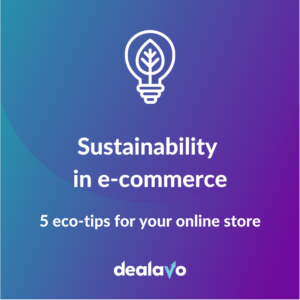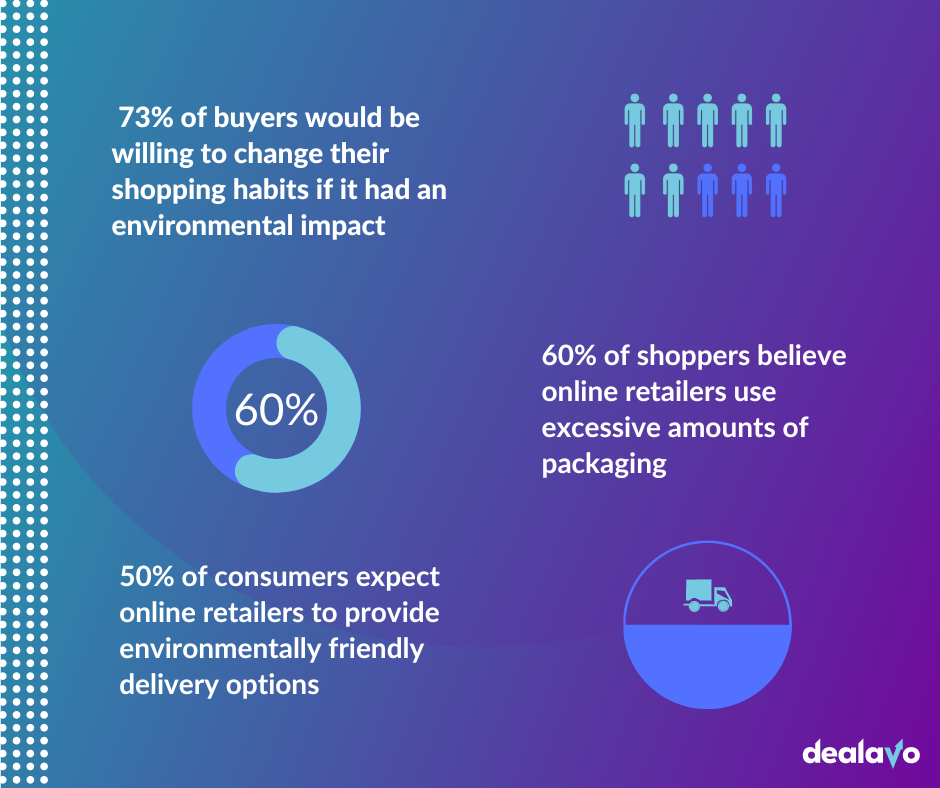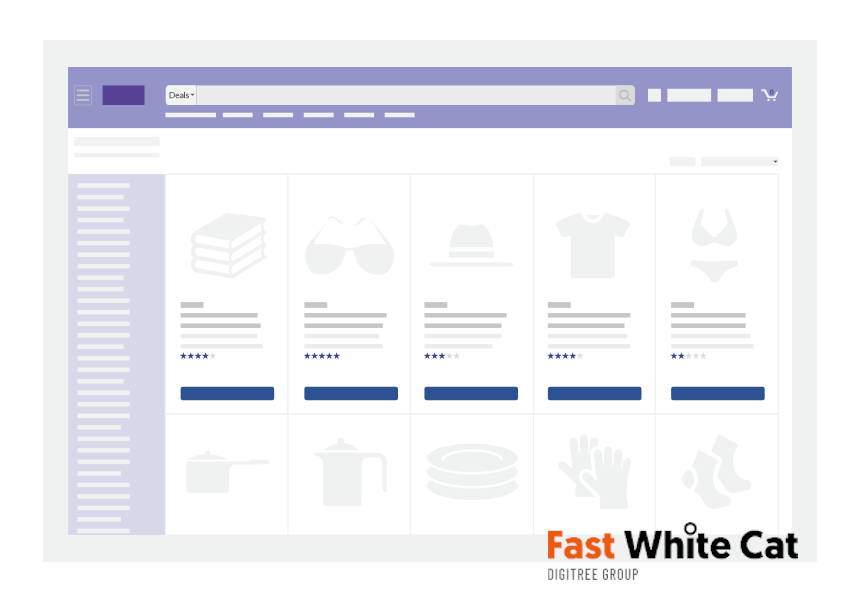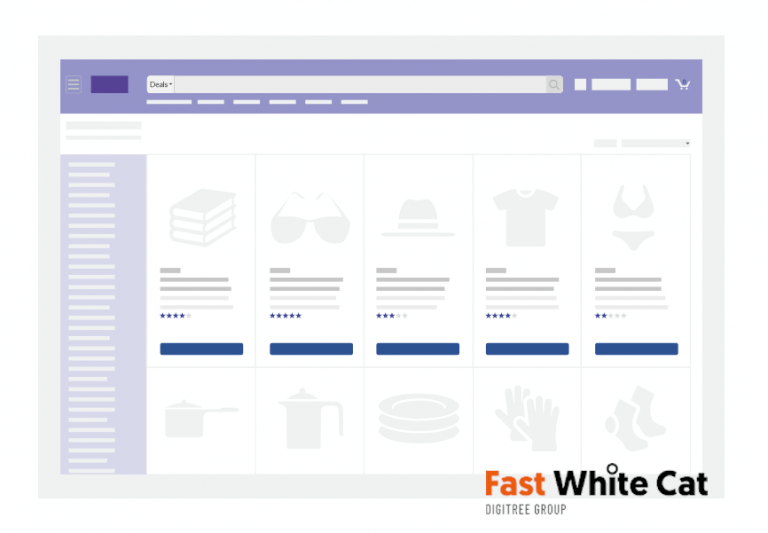
Sustainability in e-commerce: 5 eco-tips for your online store
- 12 April 2023
According to the latest reports, over 50% of digital consumers in Europe are concerned about the environmental impact of online shopping. Regardless of whether the topic of ecology is something that takes your mind or something rather irrelevant – this is a number that we should not ignore. So what’s the idea of sustainable development in the e-commerce industry and how to combine being eco with effective online sales? We explain this in the article below.
Ecology in the e-commerce industry – a real need or a temporary trend?
The e-commerce industry is one of the fastest-growing industries in recent decades. No wonder – for many customers, convenience, availability, and unlimited assortment are indisputable arguments in favor of online shopping. Although buyers’ interest in e-commerce opportunities has not waned in recent years, we may notice significant changes in consumer behavior. Customer 4.0 makes his purchasing decisions differently. Despite the product and its price, the shopping experience along with the company’s values are playing an increasingly important role for the modern consumer. And one of the major values of today is ecology and environmentally friendly production.
According to research by Nielsen – a global leader in data and analytics, 73% of buyers would be willing to change their shopping habits if it had an environmental impact. Furthermore, according to Meta Foresight, American consumers are now 1.3 times more likely to pay more for sustainable and environmentally friendly products.
The policy of the European Union is also significant. As reported, by 2030, the EU is planning to reduce greenhouse gas emissions by at least 55%. Considering the major changes in the e-commerce industry that took place after the introduction of Omnibus, we can be sure that the “green revolution” in the near future will also apply to online commerce.
Therefore, both the change in consumers’ behavior along with the top-down legal regulations prove that the topic of ecology and sustainable development will have an increasing impact on the direction of the e-commerce industry.
Why e-commerce is not eco-friendly?
Let’s consider, however, what aspects of online sales may be considered problematic in terms of ecology and sustainable development.
First of all, in the vast majority of cases, online sales are not ecological. There are many reasons: from environmentally unfriendly assortment, and carbon-intensive supply chains, to unsustainable shipping packaging. Unfortunately, practices such as dropshipping, although very profitable, are conducive to the overproduction of low-quality goods, support fast fashion, and in a broader perspective, affect the degradation of the natural environment through water and air pollution or uncontrolled deforestation.
Does this mean we should all close our online stores?
Absolutely not!
On the contrary – due to the growing consumer awareness, we should focus on the development of the e-commerce industry that will meet the challenges of climate change, will be adapted to the requirements of the EU and the World Trade Organization, and will increase customer satisfaction and wealth our portfolio.
But is all of this even possible?
How can a sustainable development strategy bring you more profit?
At first glance, profitability, and sustainability do not go hand in hand. After all, greater care for the environment is associated with greater expenses – changing suppliers, producers, or packaging to ecological ones can be quite expensive. However, are there any advantages to implementing a sustainable development strategy in your online store? Of course! Let’s take a closer look at some of them.
Greater customer satisfaction
According to the latest E-commerce Delivery Compass report, over 50% of consumers expect online retailers to provide environmentally friendly delivery options, and 60% believe online retailers use excessive amounts of packaging. According to the Statista platform, more than half of Amazon users share a similar opinion.
The mentioned statistics indicate that switching to ecological solutions will increase customer satisfaction with the purchasing process in your store. Greater satisfaction also means greater loyalty and a higher retention rate.
Lower costs
Going green can also help reduce costs. For example, by eliminating unnecessary packaging, you will not only meet customer expectations (as shown by the statistics we have already cited) but also reduce the costs of materials used when preparing products for shipment. Lower costs will also allow you to increase the margin of the offered products and, as a result, will contribute to an increase in sales profits.
Being eco also means recycling. However, today’s market is being slowly conquered by upcycling. In short, it is a method of giving waste products a second life. The assumption of upcycling is also to create a product that will have a greater value than its original version. In practice, this may mean, for example, creating furniture from wooden pallets, lamps from bottles, or toys for animals from cardboard boxes that are no longer needed. Such creatively produced items will certainly be popular among lovers of “zero waste” and generate additional profit.
Better brand positioning
Opinions about the store often have a final impact on the customer’s purchasing decision. Although the price is still the most important criterion, managing the brand’s reputation is also an indispensable part of running a business.
Positive customer reviews build brand trust by attracting new customers and increasing the loyalty of existing ones. The application of the principles of sustainable development in your store will allow you to acquire a completely new, and growing audience.
What’s more, being eco will give you an image advantage over your competition, which in combination with monitoring and price optimization will undoubtedly have a positive impact on the results of your store.
5 eco-tips for your store
The application of a sustainable development policy in online stores does not have to be associated with a strategic revolution. Below you’ll find 5 simple ideas that will make your store greener and more attractive to shoppers.
Use biodegradable packaging
Limiting plastic, foil or foam is the first step to creating an environmentally friendly business. The second step will be, for example, the use of ecological and biodegradable package fillers or bubble paper. In the case of packaging, also pay attention to their appropriate size and weight. Too large cartons will force you to use more fillers, and excessive weight will affect shipping costs and CO2 emissions.
Choose environmentally friendly deliveries
Delivery is an integral part of e-commerce. You use them both when ordering products from a distributor or manufacturer, and by sending a finished product to customers. How to make the whole process greener?
First of all, order products in bundles.
Secondly, choose shipping companies that are guided by the values of sustainable development.
Last but not least, limit express delivery for selected products only. For example, you can use fast shipping when ordering more goods or when a customer buys a product signed as organic.
Update the returns and complaints policy
The possibility of returning the purchased goods is a consumer’s basic right. Abusing this right, however, may involve additional costs and, moreover, have a negative impact on the environment, for example through excessive use of courier services and additional greenhouse gas emissions. So make sure that your products are not defective and that orders always meet customer requirements.
Remember to provide your customers with the most accurate description of the product, if possible enriched not only with photos but also videos – this will minimize the risk of dissatisfaction with the purchase and unnecessary returns.
You can also try to dissuade the customer from the decision to return, e.g. by offering them a discount on their next purchase or lowering the price of goods that cannot be refunded. However, all this should be clear before the purchase. Inform your customers about the new returns and complaints policy in your store, e.g. through the FAQ section on the website.
Expand your offer with organic products
A fairly uncomplicated move will also be to enrich the existing offer with new, ecological goods. Follow current market trends, analyze the list of bestsellers on available marketplaces, and check the competition’s assortment to find inspiration. A few products are enough to get you started. It’s very likely this small change will help you gain a new group of recipients.
Increase AOV
Could it be green to encourage customers to buy more products? Of course, it is!
Increasing shopping carts is a win-win for your shop, customer, and environment. How it’s possible? First of all, buying a bundle of products is one shipment and one package, so you reduce your carbon footprint and minimize the number of materials used. What’s more, your profit from sales also increases. Customers, on the other hand, can save time and money – especially if you encourage them to buy attractive promotions.
The green future of e-commerce
The topic of ecology in the e-commerce industry is more and more frequently and widely discussed by both consumers and online sales specialists. This is caused not only by global trends but also by the fact that the e-commerce industry often does not respect the principles of sustainable development. Excessive use of harmful materials or increasing the carbon footprint are just some of the challenges that online sales can pose.
On the other hand, online shops are the future. The number of digital consumers is growing year by year and there is no indication that it will decrease.
We can therefore be sure that the issue of sustainability in the e-commerce industry will be part of a heated discussion and the subject of many legal regulations in the near future.
That’s why preparing for changes today is definitely worth considering. And on top of that, operating in an eco-style will give you a significant advantage over your competition.






